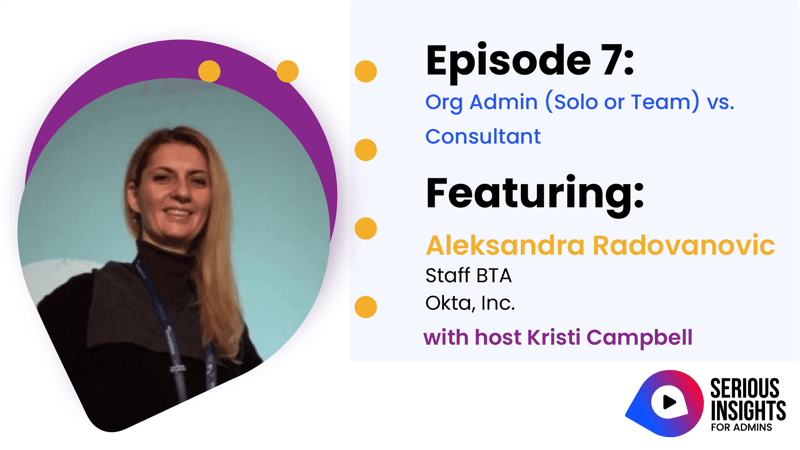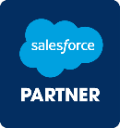- Solutions
-
Products
-
Resources
Sales Automation: What It Is, How It Works, and What to Automate First by Kristi Campbell View all Blog Posts >Get the App, Get the Sidebar, & Get Your Trial Going HereUnleash limitless growth opportunities by partnering with Cirrus Insight.
- Pricing
Filter By:
- All topics
- Sales Intelligence
- Salesforce
- Sales Productivity
- Sales Strategy
- Sales Prospecting
- Book More Meetings
- Sales Activity Data
- Company News
- AI
- Sales Leadership
- Sales Metrics
- Team Scheduling
- Prospect Smarter
- Serious Insights
- Comparison
- Sync To Your CRM
- Conversation Intelligence
- Email Blast
- Email Campaigns
Serious Insights: Org Admin (Solo or Team) vs. Consultant

On this episode of Serious Insights for Sales Admins, Kristi Campbell brings on long-time friend and fellow admin, Aleks Radovanovic.
Hold the phone, stop the presses, and pause the music because we are back!
On this episode of Serious Insights, Aleks Radovanovic joins host, Kristi Campbell, to discuss her experiences as a Salesforce Admin and share some nuggets of wisdom.
A veteran of the community, Aleks dabbled in the position’s three primary incarnations, serving as an admin in a solo, a team-based, and a consultant role. Now thriving in her position as a Technology Analyst for Okta, our guest looks back on her experiences with adoration.
A nearly two-decades veteran herself, Kristi also has experience in numerous admin roles, which she shares throughout the episode.
Together, the two take a stroll down memory lane to discuss the differences in solo, team-based, and consultant roles, as well as how to pick the position best for you!
Let’s make like the Beatles and rock n’ roll!
On Solo Admin Roles
Counter to some of our guests of the past, Aleks’s Salesforce journey started intentionally – she is quite literally the opposite of an “accidental” administrator.
Early in her professional career, our guest used Salesforce as a way to track her applications for job openings – where she sent them, who responded, when interviews were, etc. The platform was a match made in heaven, even when it was just for personal use. A self-starter, Aleks even went out of her way to learn customizations to make the platform work for her.

In a chance meeting at a baby shower, Aleks overheard a small business owner gripe about the difficulties of tracking sales in Excel. While traditionalists will say mentioning CRMs at a baby shower is inappropriate, our guest threw caution to the wind and shared her newly discovered platform; after using Salesforce herself, she knew the solution was what the owner needed.
That owner offered Aleks a job on the spot.
Tasked with implementing Salesforce for his small business, Aleks lept from a casual CRM user to a solo admin role in the blink of an eye. Like many solo administrators before her, our guest found herself immediately in the middle of the fire – forced to balance her responsibilities with still learning how to do the role itself.
In line with her persevering nature, Aleks did what all great admins do: ask for help, learn, and execute. Combining her personal knowledge, industry tutorials, and the guidance of an outside vendor, the young admin rose to the occasion – shortly after implementing Salesforce the small business increased revenue by 300%. The enormous growth caught the eye of a large banking company, which chose to buy out the business.
Ultimately, her early success would cost her her position; like many buyouts, the banking company chose to retain their in-house staff and cut redundant roles. The experience she gained, however, was significantly more valuable than whatever role she missed out on.
Kristi had a similar path, also starting in an admin role with a small organization. Unlike Aleks, her employer had already implemented Salesforce, but did not have an active admin. Noticing the need, Kristi eventually (and accidentally) filled that role – seemingly becoming a solo admin overnight.
Reflections
Now years removed from their first admins roles, Aleks and Kristi have had ample time to reflect on their experiences. Even with their different paths, the two agree on the same notion: the inherent nature of solo work is both valuable and problematic.
On one hand, the position of solo admin gave both our guest and host the opportunity to learn by doing – the only way you survive jumping into the fire is by moving, afterall. By being the individual admin for the organization, both parts of our duo were forced to expand their knowledge quickly, while simultaneously preparing for inevitable changes and adaptations.

Because of their individual drive and desire to be successful, both Aleks and Kristi were able to leverage their individual admin status into endless learning opportunities. Even years removed from their first roles, the knowledge and experience gained remains the foundations for their current success.
Counter, solo roles are inherently lonely. While they grew significantly because of their inherent independence, both agree that solo roles also inhibited their ability to learn. Without other contemporaries, their Salesforce knowledge was limited strictly to their own efforts.
Perhaps unsurprising for some, the duo's biggest takeaway is the importance of Salesforce communities. By joining their local chapters, the two side-stepped the largest drawback of solo roles. No longer isolated, both saw significant growth in their abilities, unlocked future opportunities, and made lifetime connections.
Time and time again, this belief has been proven correct – starting with our next section.
On Admin-Team Roles
Through her networking in the Vancouver Salesforce community, Aleks met admins at a large telecommunications company. After cultivating a relationship, our guest eventually received an offer for a technical interview with the business.
Focused entirely on her skillset, Aleks passed the evaluation with flying colors. Even with minimal admin experience, the telecommunication company offered her a position immediately.
In just one year, our guest went from using CRMs casually, to becoming a small business admin, to joining the largest Salesforce customer in Canada. Sometimes, things really do work out perfectly.

Joining the customer support org, Aleks quickly transformed from a big fish in a small pond to a microscopic insect in the Pacific Ocean. Unlike her small business, which only recently introduced Salesforce, her large telecommunications company had 18 different orgs, each with their own teams.
At her new company, she learned about the nearly endless uses of Salesforce, including the many applications that can coexist with the CRM. Unlike her start, where she was simply moving spreadsheets to Salesforce, her new organization used the platform at a higher level – focusing on integrations, outside applications, and more.
Our guest wasn’t in Kansas anymore.
Reflections
With the help of time and experience, our pair reflected on Aleks’ time in a team role and discussed how large organizations differ from small ones.
While the two are passionate about the impact early solo roles had on their careers, they agree junior roles for large companies can have immense value. With direct access to an internal community flush with experience, junior roles have the ability to learn proven skill sets, best practices, and methodologies without being thrown directly into the fire.
Leveraging a less hectic environment, a team-based role offers learning opportunities backed by experienced professionals, which are perfect for new admins.
Further, unlike smaller, growing companies, large organizations bring an existing Salesforce structure on the technical end. This allows admins to focus on building better processes and improving existing configurations, both of which are essential skills for veterans in the community.
As a negative, team-based roles for large businesses can have their own silo effects. While she now had an internal community, Aleks could easily have pigeon-holed herself into customer support orgs. As a result, our guests note that community is still vital to long term success.
Overall, our two Salesforce MVPs feel that team-based admin roles in large organizations offer valuable learning opportunities without the overwhelming responsibilities of solo positions. Free from managing everything, these roles provide admins with the ability to grow their skills in a controlled environment.
Aleks says that, without a doubt, joining a large business in a team-based administrator role gave her the experience she needed to transition into consulting. In particular, she credits her time at a large company for developing her project management, project scope, and relationship building skills.
On Salesforce Consultant Roles
After her time as a solo admin, and her foray into team roles, Aleks migrated to her new focus: Salesforce consulting. The transition saw dramatic differences almost immediately.
According to Aleks, the consulting world sees a significantly faster dynamic than traditional admin roles. Similar to a start-up environment, decisions are made hastily and adaptations are expected. Project management is thus the key to success.

Unlike her time as an admin, her priorities and procedures were largely impacted by outside influences. Because consultant roles work hand-in-hand with businesses, their decisions largely shaped her responsibilities – even changing her projects completely.
Whereas in earlier roles she could work relatively independently, consulting requires coordinating with client’s Salesforce administrators because they possessed knowledge she didn’t (business requirements, the depth of the system, previous projects, etc.). As a result, she found that collaboration and communication is key for any successful Salesforce consultant.
Just like her previous transition, transitioning to a consultant role once again changed everything for Aleks.
Reflections
Like fine wine, Aleks’s perspective on consultant roles has only matured better with time.
While an ideal fit for her career, our guest couldn’t help but note the drastic differences between consulting and in-house admin roles.
Unlike in-house admins, consultants are used for specific skills, which drive their own businesses forward. As a result, consultants are incentivized to grow their knowledge in specific niches over general Salesforce-use. According to Aleks, this leads consultants to regularly straddle the line between becoming experts and pigeon-holing themselves.
In her own work, our guest forced herself to grow her skills more intentionally.
Making things a bit easier, however, was the realization that Salesforce is inherently impossible to master. As a result, Aleks came to the belief that expertise in a niche is more valuable than basic knowledge. Of course, there is a balance between the two, which differs by person and responsibility.
Along with expertise, our guest noted the importance of industry knowledge as well. Because consultants are brought in for outside assistance, technical skills are not necessarily as valuable. Instead, the ability to understand and drive key KPIs within the restraints of the industry is key.
As a whole, Aleks noted that consulting allows you to continually learn, but forces you to choose priorities and focuses.
Choosing Your Ideal Role
The differences are obvious between solo, team-based, and consultant admin roles, but how do you choose?
Both Kristi and Aleks agree that the biggest factor should be your intention: do you want to own the CRM, be a part of it, or help it? If you chose the first answer, solo admin roles may be your best fit. The second, team-based roles. The third, consulting.
After that, choosing organizations that fit your personnel, procedural, and purpose-driven needs is most important. A role is only a good fit if the other conditions are good fits too.
What really matters, however, is understanding that careers go through phases.
Regardless of your career choice one day, your organizations, work styles, and preferences will change over time. As a result, it is okay to explore different roles and responsibilities throughout your career.
As you do so, be sure to highlight your skills over your titles. Both Aleks and Kristi are quick to note that role names are not a representation of skills – a subject discussed in depth in our previous episode.
That is the reality for admins: skills are most important.
According to our guest and host, if the desire is there, the professional skill set won’t be damaged in career changes. As long as you have a strong understanding of Salesforce, and a willingness to learn, you can transition into any of the three roles.
All to say, our guests truly don’t think you need to decide a role. Perhaps it’s avoiding the question, but they genuinely believe growth and change are a part of the admin experience. As a result, they recommend continuous learning and taking chances on opportunities.
Best of luck!
AdMinute
At the conclusion of each episode, our fearless host invites her guests to share any articles, videos, or resources that sparked their interest or cultivated their knowledge.
In this episode, Aleks recommended Trailblazer Military Office Hours. Happening every Friday, these community-driven learning sessions offer admins of all skill levels the opportunity to discuss business problems and explore solutions. Because the meetings are consistent, you can even add it to your routine. What an easy way to grow your community!
Kristi also had an AdMinute recommendation. For today, she recommends Santanu Boral’s Exploring on Salesforce blog. Perfect for new users, the blog is filled with tips for admins trying to gain experience to get their designer certification. For admins looking to enter a whole new role, this website is a great start!
To learn more from Kristi, visit the Serious Insights for Salesforce Admins series page.

.png?width=1268&height=1772&name=Sidebar-C%20(1).png)
